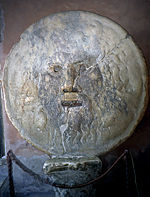Truth
Truth is spoken about in two ways: either as deep, important wisdom, or as a certain desirable quality of any statement, no matter how trivial. Religious thinkers sometimes speak of the Truth—with a capital "T"—as meaning an entire worldview, or of some deeply important insight, or even as God himself.[1] By contrast, for contemporary philosophers, the topic of truth is a rather abstract, technical one in the philosophy of language: they study what we mean whenever we say that any casual claim, such as the claim that I just arrived home, is true. For discussion of deep Truth, we recommend that you consult the articles religion, wisdom, enlightenment, God, and worldview. The following article concerns the abstract, technical topic.
The word "truth" also has a history of being used as a polemical tool, as when a person tries to exaggerate the believability of a statement by such phrasing as, "It's the pure and simple truth"[2], as though increasing the emphasis thereby proves the assertion.
Notes
- ↑ The Bible verse John 14:6 has Jesus say, famously, "I am the way, the truth, and the life. No one comes to the Father except through me."
- ↑ Oscar Wilde made a famous rebuttal of this tactic: "The truth is rarely pure and never simple" (from The Importance of Being Ernest, Act I).
